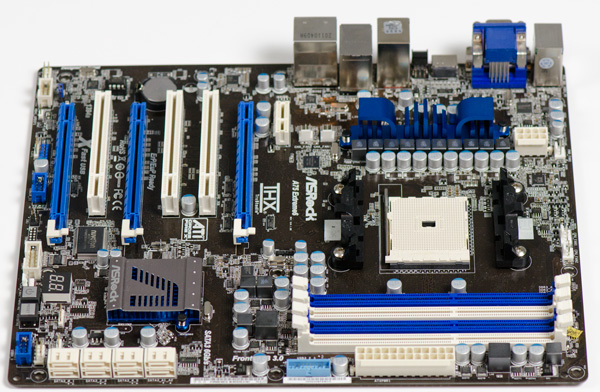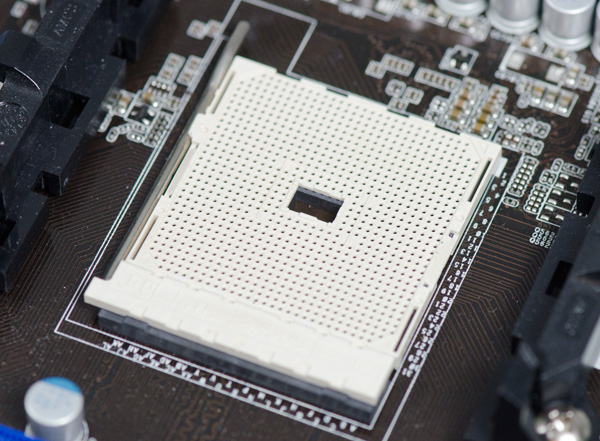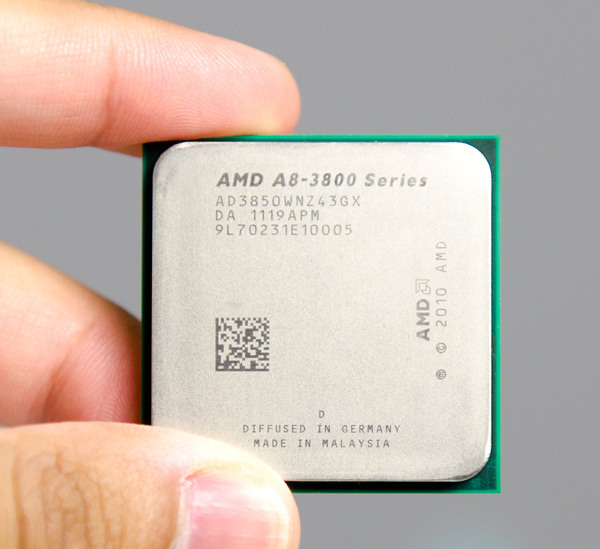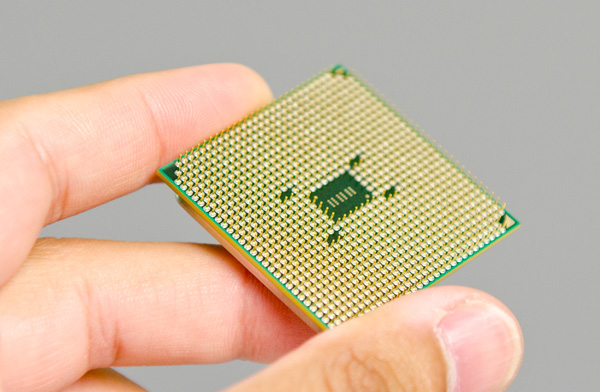The Llano Desktop Preview: AMD A8-3850 CPU & GPU Performance
by Anand Lal Shimpi on June 14, 2011 12:00 AM ESTIf you haven't gotten the hint, today is all about Llano. The big story is of course Llano's notebook appearance; however, in the coming weeks you'll be hearing a lot more about Llano on the desktop as well. This is AMD's Socket-FM1, the brand new socket that'll be used for desktop Llano parts:
If you read our Computex coverage, the socket should look pretty familiar. Motherboard manufacturers all over Taiwan are busy readying their Socket-FM1 boards for retail release. In fact, there was so much interest in desktop Llano on behalf of the motherboard manufacturers that a number of Socket-FM1 boards and CPUs made their way off the island as Computex ended.

Existing Socket-AM3 coolers will work on FM1 motherboards
By now you may have already seen a lot of information leaked from AMD's Llano presentations, as well as its desktop strategy. In the past few days performance numbers have been revealed as well. While we're hard at work on our full review of AMD's desktop Llano APU, we wanted to chime in with some thoughts on Llano's desktop performance.
AMD isn't ready to disclose pricing or the entire product matrix for Llano on the desktop, but what we do have is the high-end desktop Llano SKU: AMD's A8-3850.
The 3850 has four cores running at 2.9GHz and doesn't support Turbo Core. On the GPU side it has the full Radeon HD 6550D configuration with 400 shader processors running at 600MHz.
Sandy Bridge's GPU performance is the target, but how much better will AMD do on the desktop? Let's find out.













131 Comments
View All Comments
maroon1 - Tuesday, June 14, 2011 - link
I hope that anandtech use similar DDR3 speed for both intel and AMD setupkillerclick - Tuesday, June 14, 2011 - link
It's good enough for the era of PS3 and XBOX360 console ports but AMD is way behind Intel and that gap is growing day by day.StevoLincolnite - Tuesday, June 14, 2011 - link
Llano isn't meant to compete with the high-end Sandy Bridge, it's a low-end/mid-range chip, wait for Zambezi to see AMD's answer to the Core i7.duploxxx - Tuesday, June 14, 2011 - link
what charrts have you been looking at? did you check any gaming performance or multithreaded apps??milli - Tuesday, June 14, 2011 - link
Yes bc we all run 7Zip 24/7 ... right?I'd rather have an i3 2100 + HD6450 if the leaked price of $170 is anything to go by. The i3 combo will be much more responsive.
duploxxx - Tuesday, June 14, 2011 - link
first of all there are no leaked prices since they refer to SKU that never exist.Secondly the A8-3850 has more then CPU power enough, if you want a more responsive system invest in better HD RPM or SSD, general apps perf difference with just a few MHZ and Intel arch is whishfull thinking.
third: Intel boards have always been more expensive, the FM1 boards have better specs thx to USB3 and you have additional cost of the GPU and powerconsumption. You from a fanboy perspective might think that way (i would never select a 6450 low budget in the first place for a GPU board but anyhow) but OEM think different and focus on general consumers.
milli - Tuesday, June 14, 2011 - link
Well you're talking to a SI here with 14 business experience, so i'm no fanboy.My info comes from here:
http://www.cpu-world.com/news_2011/2011061301_E2-_...
All the SKU's mentioned there do exist.
50% performance advantage on a single thread is nothing to scoff at. That's something you will feel no matter your IO. Since we're talking sub-$500 systems, i don't understand you bringing up Raptors or SSD's.
Actually Intel H61 MB's (with USB3) are very very cheap. Something like the MSI H61MU-E35 costs $80. If you think FM1 boards are going to be a lot cheaper, then you are wrong.
I hope you know that an A8-3850 has a TDP of 100W. Power consumption? i3+HD6450=92W.
chiadog - Tuesday, June 14, 2011 - link
170 for the chip is outrageous, given the underwhelming performance in CPU and GPU. If they can drop the price to ~200-220 with the mobo, I'd pick one up for HTPC. The chip seems much more "exciting" on the mobile side, even then it is more of a snooze.PrinceGaz - Tuesday, June 14, 2011 - link
"50% performance advantage on a single thread is nothing to scoff at. That's something you will feel no matter your IO."Really? What are you doing with your computer which actually relies so heavily on its single-threaded performance? Even if you can name something, try to name something which is the sort of application this solution is aimed at. My nearly six years old Athlon 64 X2 4400+ is much slower runing single-threaded stuff than this new chip, but can run all the typical apps fine and only really struggles when I task it with HD video work, work which really could benefit from more than two cores (which the A8-3850 has). In that respect, more cores is what I need, and it provides that.
Having said that, Ivy Bridge is probably what I'll buy as I build a new box rarely, but when built, is something I expect to last (just like this one). AMDs high-end offering due later this year should be interesting and provide just the push needed to both companies, to make 2012 the ideal year to build a new box (with either an Intel or AMD CPU depending on which I consider best) which will see another few years through.
seapeople - Friday, June 17, 2011 - link
Are you serious? Single threaded performance defines the CPU experience for probably 95+% of the apps most people use. I'm talking poorly GPU accelerated flash, firefox, the entire Windows GUI , and most of Microsoft Office for that matter. Try updating a bunch of cells in a complicated excel spreadsheet with a quad core CPU and watch in pain as your spreadsheet (and now every other excel spreadsheet too) freezes up while your CPU chugs along at 25% to update your cells. While complex calculations are multithreaded, it's easy to push excel into single threaded mode with a bunch of dependencies.Oh, and once you do have a SSD, watch your CPU usage as you install a bunch of Windows Updates... yep, that's single threaded too for the most part. Apart from high end multi-threaded applications that only a small percentage of users even use, the biggest benefit to a dual core CPU, for example, is making faster threads rather than increasing the number of cores.